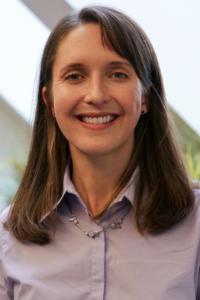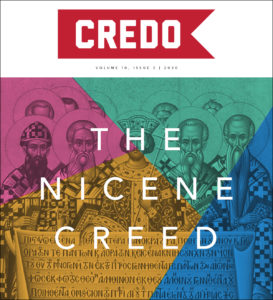Amy Peeler is Associate Professor of New Testament at Wheaton College and Associate Rector at St. Mark’s Episcopal Church in Geneva, Ill. She is a leading scholar on the book of Hebrews, and in this interview, Timothy Gatewood (executive editor of Credo) discusses her research interests, as well as her journey into the academy.
Before biblical studies you started pursuing a degree in psychology for a career in counseling. When did you realize that you wanted to teach the Bible for a living?
When I started thinking about graduate school, I knew I would need to choose between the two subjects I enjoyed. As I thought and prayed, I realized that I could imagine my life without psychology, but simply couldn’t imagine my life without studying the Bible academically. My wise mentor, one of the New Testament professors for whom I served as a TA, put my mind at ease when he shared with me that as a professor, I would not only have the chance to study and teach the Bible, but I would also have the chance to have a good deal of one-on-one conversation, not quite counseling, but I could walk alongside students as they figured out their lives and callings. Thankfully, since I’ve had the chance to work at small Christian liberal arts colleges, his advice has proven totally true.
You have dedicated yourself to the book of Hebrews. Why?
Similarly, in this instance, I faced a choice between two options. As I neared time for formally deciding on a dissertation topic, I was deciding between the Pauline corpus and Hebrews. I found both completely fascinating, but I knew that the field of Pauline studies was quite crowded. Hebrews seemed more like an open space, an especially encouraging reality for young scholars. Its way of holding together extremes, Christ’s humanity and divinity, the Old and New Covenants, Greco-Roman and Jewish traditions, the grace and wrath of God, offered so many puzzles I knew it would take a lifetime to understand them. I’m currently writing a commentary on Hebrews, and I find fresh insight every day I work on it!
We can’t interview a Hebrews scholar without asking – who wrote it?
Of the persons we know from the New Testament, I find Apollos (Acts 18:24–28) the most compelling match.
You have emphasized the familial themes that are found in the book of Hebrews. What does it mean for Christians to personally embrace the Fatherhood of God?
Wow! That is a big and wonderful question. Actually, I’m just finishing up a book on that, so answering in a few sentences might be impossible, but I’ll try. The most important thing is that embracing the Fatherhood of God puts one in connection with Jesus Christ. We can have a relationship with God as our Father only because Jesus does. Such an image includes many possible pitfalls, but when we ground that relationship in Scripture and the Christian tradition, the depth of meaning and life in being a child of God is inexhaustible. Embracing the Fatherhood of God puts one in connection with Jesus Christ. We can have a relationship with God as our Father only because Jesus does. Click To Tweet
What would you say to young women who want to pursue a career in Christian academia but may feel intimidated or perhaps even unwelcomed?
Please reach out to me! Seriously I love connecting with women who are having a hard time finding their way. I was so blessed with wonderful mentors; I’d like to be the same. I’d also recommend connecting with the amazing Logia organization or any of the student groups through Society of Biblical Literature, American Academy of Religion, Institute for Biblical Studies, or Evangelical Theological Society.
Theologically, know beyond a shadow of a doubt that you are created in the image of God, redeemed by the work of Christ, and empowered by the Holy Spirit. In the past, God has called women to teach, as recorded in Scripture and Christian history, and as many of my friends and colleagues would now testify, God continues to do so. The academy is thrilled to welcome women who want to pursue this vocation.
You have published a few articles on Mary including one in which she is addressed as “The First Christian.” It seems at times that Protestants are sometimes weary to study Mary too closely. What are some crucial lessons that we may miss when we de-emphasize the life of Mary?
Similarly, very hard to be brief! My book wrestles with the Fatherhood of God through the lens of the Incarnation, and that means Mary plays a very prominent role! First and foremost, if we forget about Mary, our Christology is anemic and possibly even heretical. Her place in the story is immovable, for she proclaims in word and deed the humanity of God who dwelt with us. In addition to her prime role to testify to Christ, she also shows the way of faith for all people, how to be both bold and humble in our trust in God. Finally, she testifies that God values women. At the very heart of the Christian story is the truth that God deemed the body and life of a woman worthy of the holy presence of God. If we forget about Mary, our Christology is anemic and possibly even heretical. Her place in the story is immovable, for she proclaims in word and deed the humanity of God who dwelt with us. Click To Tweet
To say that the author of Hebrews references the Old Testament is a bit of an understatement. How should Christians understand the relationship between the testaments and how should that affect their interpretation of the Bible?
This is one of the many reasons I love Hebrews. It keeps me honest in needing to be grounded in both testaments. All of the New Testament (and the theologians of subsequent generations) were very clear, that God, the Father of Jesus Christ is the God of Israel. To rightly hear the message of Christ one simply must be hearing the message of Israel’s Scriptures. Those texts testify to God’s faithfulness to Israel in their own right and point toward the fulfillment of those promises in Christ. I recognize that is a very complicated statement. Practically, I would highly recommend regularly reading from both testaments personally and inviting your pastors to preach from both testaments regularly.
The word on the street is you enjoy Crossfit when you aren’t deep into research. What are some of your favorite and least favorite exercises?
I am a total addict! Because I’ve run for a very long time, leg exercises are pretty easy for me: box jumps, wall balls. My favorite Olympic lift is Clean and Jerk, split jerk specifically. Who likes burpees? No one! I’m so thankful to the gym in St. Andrews where my husband and I got started, Functional Fitness, and my current gym in Wheaton, FTX! Truly I feel God’s pleasure when I’m at my box.
What is a habit that has benefited your research that you wish you had started sooner?
Turning the work off. I was a complete workaholic until I had my daughter (now 12). With her, I learned to take breaks. I’ve continued that practice, and now my work time is imminently more effective.
You have currently worked at Wheaton for eight years. How does Wheaton continue to cultivate its impressive legacy within evangelicalism? What do people find so intriguing about the institution?
I believe we do so only by God’s grace. Our board and leaders are deeply committed to being faithful to the good vision that got us started. Jonathan Blanchard was a man after God’s own heart, passionate about education, mission, and justice. I’m so proud we were a stop on the underground railroad and had female students very early on. Our history certainly is not perfect, but we have a solid heritage. On a practical level, we are extremely careful in our hires. The process is extensive so that the people who work here embody the vision of the school and have kept it going. Our unwavering commitment to Christian liberal arts —rigorous, faithful education—continues to make us very attractive to a variety of students. As we look to the future, I am excited about our growth in kingdom diversity and continuing to posture ourselves as a place where Christians discuss and even disagree in charity because of our shared commitment to Christ.


